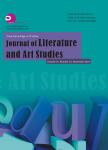
T=题名(书名、题名),A=作者(责任者),K=主题词,P=出版物名称,PU=出版社名称,O=机构(作者单位、学位授予单位、专利申请人),L=中图分类号,C=学科分类号,U=全部字段,Y=年(出版发行年、学位年度、标准发布年)
AND代表“并且”;OR代表“或者”;NOT代表“不包含”;(注意必须大写,运算符两边需空一格)
范例一:(K=图书馆学 OR K=情报学) AND A=范并思 AND Y=1982-2016
范例二:P=计算机应用与软件 AND (U=C++ OR U=Basic) NOT K=Visual AND Y=2011-2016

摘要:Picaresque novel as a genre is usually traced back to the anonymous Lazarillo de Tormes, but mystery surrounds the origin of this paradoxical narrative that appeared in 1554. In particular, the techniques of irony and paradox employed in Lazarillo as vehicles for moral and social satire are influenced by an extremely widespread classical tradition, the rhetorical paradox, recently revived and made popular by Erasmus in his Praise of Folly. Lazarillo's ties with a humanist revival of literary genres suited to social satire and self-inquiry extends to other forms of Menippean satire of which the rhetorical paradox and mock oration are only specialized forms. The Golden Ass by Apuleius, a 2nd Century A.D. prose Menippean satire, alluded to in Cervantes' Don Quixote, and Lazarillo both employ a frame-story motif, "the servant of many masters," as a vehicle for social and moral commentary. A fundamental conflict between how people appear and what in fact they are runs through the narrative, first exemplified by Lazaro's clever exposure of others, then extended to Lazaro himself. paradox extends from Lazaro himself and his actions to the very form and style of the narrative itself. In paradoxia Epidemica: The Renaissance Tradition of paradox, Rosalie Colie traces the influence of rhetorical paradox through the literatures of the 16th and 17th century. rhetorical paradox is a formal defense of an unexpected, unworthy, or indefensible subject, as in Erasmus' mock encomium of folly. rhetorical paradox criticizes and calls into question traditionally received opinion by appearing to assert one position while in fact asserting another by implication. By placing his praise in the mouth of the subject itself of that praise, the praise of folly in the mouth of Folly in Erasmus, or the praise of Lazaro the self-made man in the mouth of Lazaro, the satirist ironically undercuts the reliability of the speaker and removes all objective standards by which the discourse can be measured
地址:宁波市钱湖南路8号浙江万里学院(315100)
Tel:0574-88222222
招生:0574-88222065 88222066
Email:yzb@zwu.edu.cn

